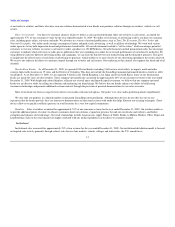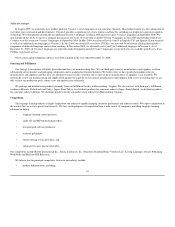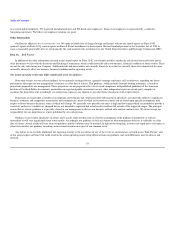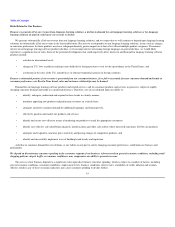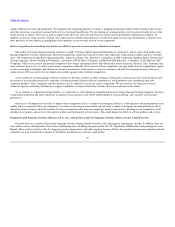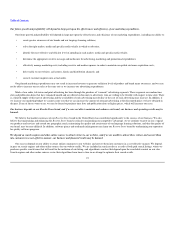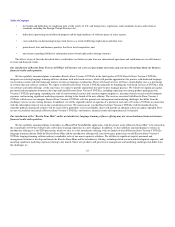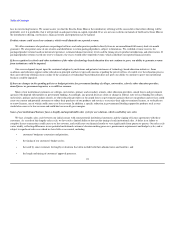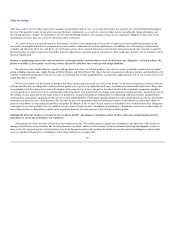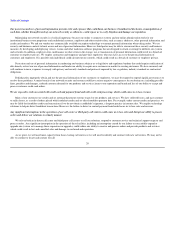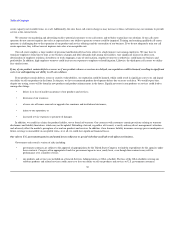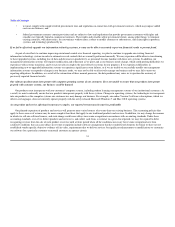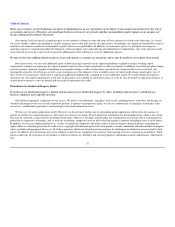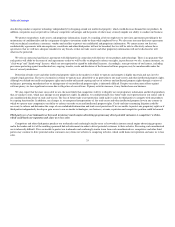Rosetta Stone 2009 Annual Report Download - page 26
Download and view the complete annual report
Please find page 26 of the 2009 Rosetta Stone annual report below. You can navigate through the pages in the report by either clicking on the pages listed below, or by using the keyword search tool below to find specific information within the annual report.
Table of Contents
face in our existing business. We cannot assure you that the Rosetta Stone Mini or the introductory offering will be successful or that either offering will be
profitable, or if it is profitable, that it will provide an adequate return on capital expended. If we are not successful in our launch of the Rosetta Stone Mini or
the introductory offering, our business, financial results and reputation may be harmed.
Product returns could exceed our estimates, which would diminish our reported revenue.
We offer consumers who purchase our packaged software and audio practice products directly from us an unconditional full money-back six-month
guarantee. We also permit some of our retailers and distributors to return packaged products, subject to limitations. We establish revenue reserves for
packaged product returns based on historical experience, estimated channel inventory levels and the timing of new product introductions and other factors. If
packaged product returns exceed our reserve estimates, the excess would offset reported revenue, which could hurt our reported financial results.
If the recognition by schools and other institutions of the value of technology-based education does not continue to grow, our ability to generate revenue
from institutions could be impaired.
Our success depends in part upon the continued adoption by institutions and potential customers of technology-based education initiatives. Some
academics and educators oppose online education in principle and have expressed concerns regarding the perceived loss of control over the education process
that can result from offering courses online. If the acceptance of technology-based education does not grow our ability to continue to grow our institutional
business could be impaired.
If there are changes in the spending policies or budget priorities for government funding of colleges, universities, schools, other education providers,
armed forces or government agencies, we could lose revenue.
Many of our institutional customers are colleges, universities, primary and secondary schools, other education providers, armed forces and government
agencies who depend substantially on government funding. Accordingly, any general decrease, delay or change in federal, state or local funding for colleges,
universities, primary and secondary schools, or other education providers or for armed forces or government agencies that use our products and services could
cause our current and potential customers to reduce their purchases of our products and services, to exercise their right to terminate licenses, or to decide not
to renew licenses, any of which could cause us to lose revenue. In addition, a specific reduction in governmental funding support for products such as ours
would also cause us to lose revenue and could hurt our overall gross margins.
Some of our institutional business faces a lengthy and unpredictable sales cycle for our solutions, which could delay new sales.
We face a lengthy sales cycle between our initial contact with some potential institutional customers and the signing of license agreements with these
customers. As a result of this lengthy sales cycle, we have only a limited ability to forecast the timing of such institutional sales. A delay in or failure to
complete license transactions could cause us to lose revenue, and could cause our financial results to vary significantly from quarter to quarter. Our sales cycle
varies widely, reflecting differences in our potential institutional customers' decision-making processes, procurement requirements and budget cycles, and is
subject to significant risks over which we have little or no control, including:
customers' budgetary constraints and priorities;
the timing of our customers' budget cycles;
the need by some customers for lengthy evaluations that often include both their administrators and faculties; and
the length and timing of customers' approval processes.
24
•
•
•
•


